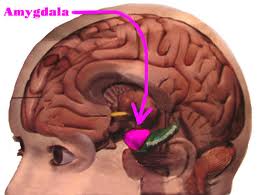When Doctors Feel Fear
 An excerpt from by Danielle Ofri. (Reprinted in the New York Times with permission by Beacon Press.)
An excerpt from by Danielle Ofri. (Reprinted in the New York Times with permission by Beacon Press.)
The amygdala is ground zero for the processing of fear in human beings. I remember the first
time I laid eyes on an actual amygdala, after slicing through a brain with a repurposed kitchen
knife in neuroanatomyclass. That’s it? I thought. That nickel-size splotch tucked below the
temporal lobes was the seat of my fears? It was monumentally underwhelming and even lacked
the poetic almond shape that its Latin name connotes.
The amygdala acts as the ringleader of the limbic system—the emotional guts of our
brain. Weaving together the hippocampus, thalamus, amygdala, and some ancient parts of the
cerebral cortex, the limbic system calibrates the nitty-gritty of who we are—our fears, our
attractions, our memories, not to mention the cornerstone imperatives of food, sex, and anger. If
psychoanalysis had a neuroanatomical substrate, it would be the limbic system. And if it wanted
a laser-like focus, especially when it comes to fear, it would train its sights on the amygdala.
I read of a patient with a rare condition that damaged the amygdala on both sides of her
brain. Though her other emotions appeared normal, she neither felt nor expressed fear.
Researchers did what they could to frighten her—brought in live snakes, set spiders loose,
showed scary movies. They even took her on a haunted-house tour. She didn’t so much as flinch.
It wasn’t that she had nerves of steel; she simply did not experience fear.
As a medical student and intern, I longed to be her. I desperately desired an emotional
shield that would block out the paralyzing fear that seemed to track my every step. If I could
only corral my amygdala and limbic system, being a doctor would be effortless.
Fear is a primal emotion in medicine. Every doctor can tell you of times when she or he
was terrified; most can list more episodes than you might wish to hear. This fear of making a
mistake and causing harm never goes away, even with decades of experience. It may be most
palpable and expressible in neophyte students and interns, but that is merely the first link in a
chain that wends its way throughout the life of a doctor. It may be sublimated at times, it may
wax and wane, but the fear of harming your patients never departs; it is inextricably linked to the
practice of medicine.
I sometimes compare career notes with friends who are in the business world, and I’ve
asked what their worst fear is. It’s usually something along the lines of making a financial
blunder, screwing up a major project, having an investment fall apart, losing a job, disappointing
the boss or family, losing money. I have to restrain myself from saying, That’s it? That’s all you
are afraid of?
That, of course, is the basic fear in medicine, that we will kill someone, or cause palpable
bodily harm. I vividly remember my first reading of Ernest Becker’s classic existential treatise
The Denial of Death. Becker posited that humans are terrified of their own mortality, and that
every action we take, on an individual or societal level, is directed (usually unconsciously) by the
necessary denial of imminent death.This precisely captured my fear as a doctor-in-training, except that the fear was entirely
conscious. I was terrified of causing death, and every action I took was an obeisance to that fear.
Medical students, for all of their competence and competitiveness, are a pretty fearful bunch,
more so than the general population and even more than their age-matched peers pursuing other
professions. Some of this is not surprising. You really should possess some fear as you begin to
jab sharp objects into other people’s bodies, prescribe potentially lethal medicines, or initiate
treatments that put lives at risk. Any medical student without fear is a cavalier cowboy better
suited to a desk job.
But the fears can easily spiral out of control and overwhelm students and interns. If this
happened only rarely, to only those few who entered the medical field with their own preexisting
mental-health conditions, that would be one thing. But the truth is that the fear overwhelms even
the most psychologically sound and well-adjusted trainee. At some point it happens to nearly
every single person who travels through the medical training process. If you don’t believe me,
just ask any doctor you know.
Excerpted from by Danielle Ofri. (Reprinted in the New York Times with permission by Beacon Press. Copyright 2013)
